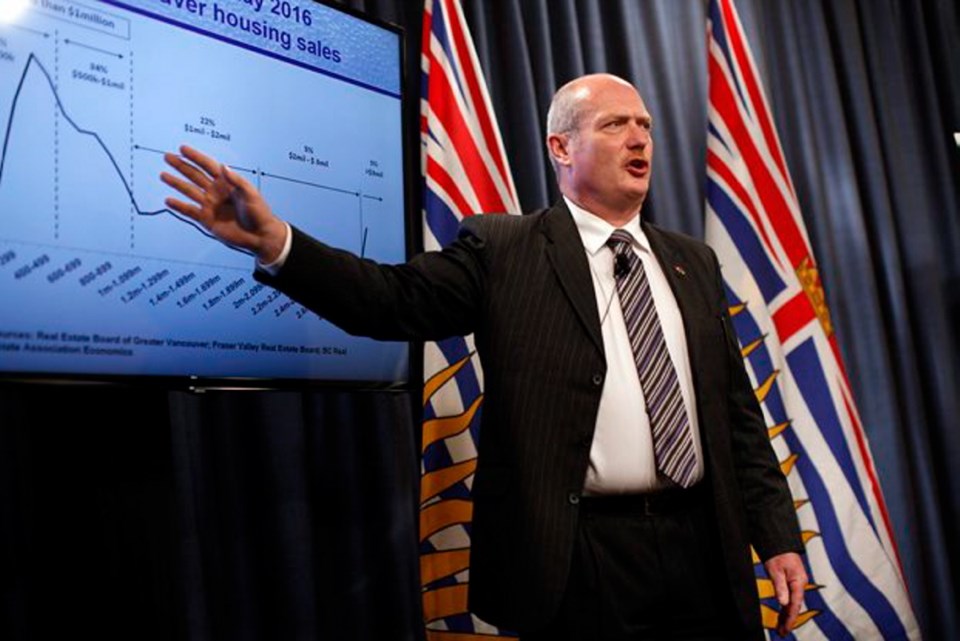 Six weeks ago, Finance Minister Mike de Jong was stone-cold on the idea of a vacancy tax, taunting the Opposition to disclose how high they wanted it and calling the concept a barrier to investment.
Six weeks ago, Finance Minister Mike de Jong was stone-cold on the idea of a vacancy tax, taunting the Opposition to disclose how high they wanted it and calling the concept a barrier to investment.
“Maybe he’d like to stand up and tell B.C. how much he’d increase taxes,” de Jong invited NDP housing critic David Eby in May. “Tell us about the vacancy tax. Tell us about the economic wall he and his colleagues would build if, God forbid, they were ever given the chance to govern B.C.”
But on Monday, de Jong pitched in to start building the wall, a term loaded with meaning these days. He announced the legislature will be recalled pronto on July 25 to give Vancouver Mayor Gregor Robertson all the authority he needs to put his version of the tax in place.
Robertson not only gets his tax, he gets to watch an unusual July sitting called expressly to meet the August deadline he decreed a few weeks ago when committing to the tax.
It’s the latest move in a major course change the B.C. Liberals are making to regain lost ground on the housing and real estate issues. The government was disengaged and hands-off as the market got more and more distorted, and more people started demanding intervention. It finally dawned on Premier Christy Clark this spring she was out of step with voters. Not only that, but the NDP was much closer to the public mood on real estate than she was.
It’s been a mad rush since then to catch up.
The first timid step in this about-face was the move to start collecting foreign-ownership data. De Jong said at the time he would get six months of data, then start analyzing it.
In the meantime, Robertson pitched his vacancy tax and wangled a meeting with the finance minister to explain it. De Jong emerged from it mostly keeping his personal views to himself and lauding all the work that went into the proposal.
The tide is running in favour of such a tax as a means of creating more rental stock, and the B.C. Liberals need to follow it. So two weeks after demanding it, Robertson learned he’ll get just what he wanted.
Last month, an independent panel reported on serious problems in the real-estate industry and recommended beefing up self-regulation. Clark went far beyond that and blew up self-regulation entirely. She announced the government will take back the full oversight that was offloaded a decade ago.
Then the foreign ownership figures were released on a rush basis. Instead of compiling six months’ worth, the finance ministry grabbed what it had — 19 days’ worth.
The rushed nature of the release said a lot more than the absurdly small sample did. Liberals are in hurry-up mode on the real estate issue.
Clark made clear what’s going on with a rushed YouTube video in late June devoted to housing affordability. She said it’s time for bold action and promised a full suite of measures. That includes a lot of things that weren’t on the table a few months ago.
The vacancy tax is aimed squarely at foreign owners.
“I tend to have a bias against singling out foreign investment for a separate punitive tax,” said de Jong in May.
That bias looks to be fading, although it’s not clear whether de Jong is entirely comfortable with the course change Clark has decided on.
The tax on the estimated 10,000 vacant residences in Vancouver suspected of being owned by foreigners is actually a dodgy, extremely problematic tax that’s going to take a boatload of bureaucrats and likely a snitch line to implement.
The upcoming legislation will change the Vancouver charter to allow for the unique tax, and allow for sharing of provincial data the city needs to identify vacancies. But all the administration costs will be incurred by the city. No other city has asked for such powers, but if they do, they will get them, de Jong said.
If it generates more money than it costs, count on me-tooism kicking in. If local governments get new tax room, they generally take it.



